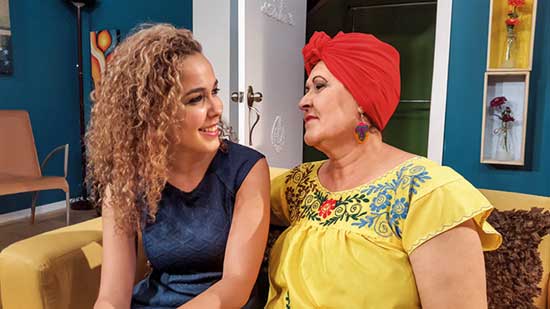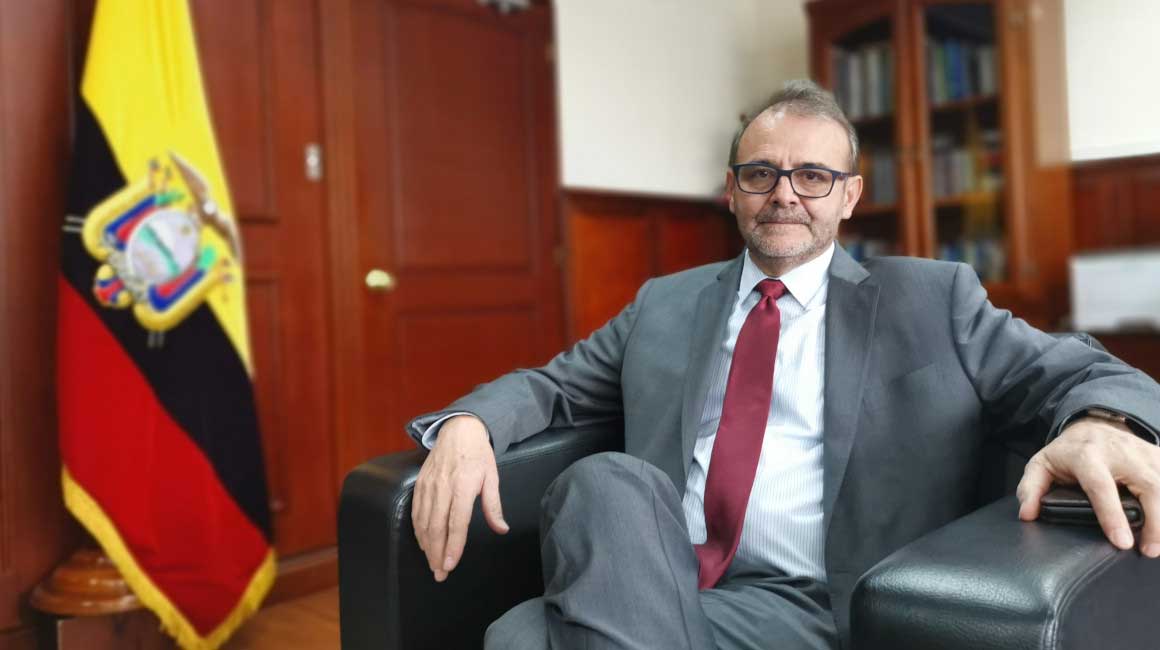Switzerland agrees to protect Mexican interests in Ecuador following diplomatic break
By Patricias Islas
Just two months after Mexico severed all diplomatic ties with Ecuador on April 5, Switzerland announced that it would assume the role of protecting Mexico’s interests on Ecuadorian soil. The agreement to this effect was signed on June 15.

Ecuadorian Ambassador to Bern, Verónica Bustamante (left), and Swiss Foreign Minister Ignazio Cassis.
Under pressure from the media, Ecuador announced the following day that it had reached a “mirror agreement” with Switzerland, which specifies that the Alpine country should act as a “diplomatic channel” to Mexico and assist Ecuador’s consular services.
A protecting power mandate requires the formal consent of the country it is exercised in. According to the Swiss foreign ministry, Switzerland signed the relevant agreement with Mexico on June 15, and with Ecuador on June 24. These signings came a week after the Swiss government’s approval of the agreements on June 7.
‘Utmost reliability and discretion’
The main role of a protecting power is to maintain low-level relations between countries that have severed diplomatic ties. It involves taking on some diplomatic and consular tasks, such as conveying messages, protecting property, and issuing passports and visas.
Consular services are usually managed by the countries’ local teams, but under the protection of Switzerland. This is also the case for Mexico and Ecuador: local teams handle administrative, technical and consular tasks, while Switzerland safeguards the so-called foreign-interest sections.
“We take on this task with utmost reliability and discretion,” says Fabian Molina, a member of the Swiss parliament and its foreign affairs committee. “In the event of a diplomatic conflict between two countries, it is crucial for both of the governments involved and their citizens to keep open communication channels and protect the citizens of the other country. In this respect, Switzerland truly acts as a protecting power.”
Apart from these two new mandates, Switzerland also acts as a protecting power for Iran’s interests in Egypt and Canada, the United States in Iran, Russia in Georgia and Georgia in Russia.
‘Both countries are at fault’
Mexico has clarified that the agreement with Switzerland does not signal the beginning of discussions on re-establishing diplomatic relations with Ecuador.
The country broke off diplomatic ties after Ecuadorian police forcibly entered the Mexican embassy in Quito last April to arrest former Ecuadorian vice-president Jorge Glas, who had been granted political asylum by Mexico. Ecuador has accused Glas of corruption.
Mexico is demanding an apology from President Daniel Noboa’s government for the raid as well as the extradition of Glas.
A resolution is not on the horizon: Mexico’s incoming president, Claudia Sheinbaum, has announced that she will maintain the same policy as the outgoing president when she assumes office in October. This suggests that the standoff could persist throughout her six-year term.
Mexico’s government is currently awaiting a ruling from the International Court of Justice (ICJ) on its lawsuit against Ecuador for violating the 1961 Vienna Convention on diplomatic relations but experts say a decision may not come for years. The inviolability of embassies and the right to asylum are enshrined in the convention.
Ecuador has filed a counter-lawsuit. It accuses Mexico of meddling in its internal affairs.
Although the verdicts of the ICJ could come down in 2025, they are “very unlikely to resolve the dispute, which is driven more by personalities than by institutions,” says Esteban Ramiro Santos López, an expert on international dispute resolution at the Geneva Graduate Institute and a political science professor in Quito.
“Mexico’s president, Manuel López Obrador, and the president of Ecuador, Daniel Noboa, have thrown ugly accusations at each other that undermine a dignified diplomatic relationship,” Santos López adds. “This dispute is taking a toll on democracy and the citizens of their respective countries.”
According to Santos López, there is no doubt that Ecuador has violated Article 22 of the Vienna Convention, which stipulates that embassies are to be considered as part of the territory of the country they represent. “But as an expert in international law, I can say that both Ecuador and Mexico are at fault for breaking off their diplomatic relations,” he says.
This is because the Convention on Diplomatic Asylum adopted by the Organization of American States, and to which both countries are signatories, states that it is “not lawful to grant asylum to persons who, at the time of requesting it, are under Indictment or on trial for common offenses or have been convicted by competent regular courts.”
Glas was convicted twice for corruption. However, Article IV of the Convention says that “it shall rest with the State granting asylum to determine the nature of the offense or the motives for the persecution”.
Swiss mediation is ‘ridiculous’
Some observers have criticised the fact that a European country like Switzerland is serving as the protecting power in this case.
“This crisis highlights the shortcomings of multilateral organisations in the region,” says Pedro Brieger, director of online newspaper Noticias de América Latina y el Caribe. “Just 15 years ago, the Union of South American Nations and the Rio Group, a permanent association of political consultation of Latin America and Caribbean countries, would have intervened in conflicts like this in the region.”
“Such mechanisms no longer exist,” he adds. “Right-wing governments in Latin America have effectively dismantled regional integration efforts. As a result, they now resort to European mediation between two Latin American countries. This is ridiculous and underscores the failure of Latin American governments to revive such organisations.”
_________________
Credit: Swiss Info

















